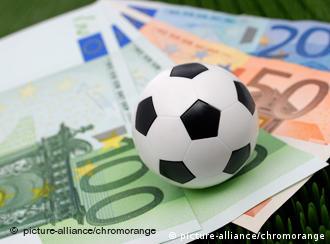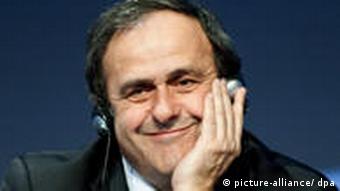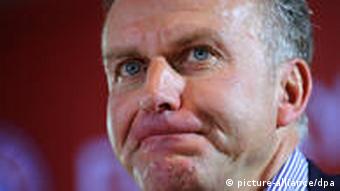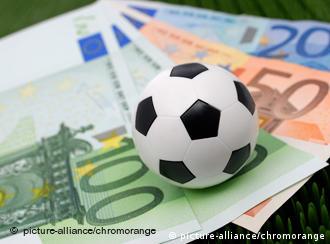The new UEFA rules limit the expenses of European football clubs in the transfer market. But few people believe in the effectiveness of the President of UEFA Platini, because punish violators … there is nothing.
Financial Fair Play: football clubs are forbidden to spend more than they earn
The new UEFA rules limit the expenses of European football clubs in the transfer market. But few people believe in the effectiveness of the plan of President UEFA Platini, because to punish violators. There is nothing.

The new set of the Club Licensing and Financial Fair Play Regulations (FFP), which regulates the licensing of European football clubs and their transfer expenses, began to operate in June 2011. President of the Union of European Football Associations UEFA Michelle Platini considers him one of the most important projects for the entire time of his stay in this position. He is sure that these rules will make European football more fair and moral.

UEFA President Michel Platini
“If the club does not behave like everyone else, and does not follow the same rules as the rest, he will have to pay for his actions,” Platini said in January 2011, presenting the final version of FFP. However, these rules will fully enter into force no earlier than July 2014. In the meantime, for the three years of the transition period, the maximum allowable level of financial costs was established for European clubs – 45 million euros (64 million US dollars). Thus, they hope in UEFA, the clubs will cease to be unprofitable. This, as Michelle Platini emphasized, a simple but strict rule: the club cannot be spent more than he earns.
Football inequality
It is in this that UEFA sees the main problem of modern football, especially when it comes to inequality that arises between the English Premier League and other less influential European leagues. In May, the British newspaper Gardian wrote that over the 2009-2010 financial year, 20 English prime ministers as a whole lost more than half a billion euros, although they earned a record 2.4 billion euros. Moreover, the UEFA report is soon awaiting the emergence of the evidence that the total debt of clubs in the English Premier League exceeds the amount of debts of all other European clubs of the highest division combined.

It is not surprising that the presidents of some German clubs openly doubt that Manchester City or Chelsea will be able to observe new rules without resorting to financial tricks. In an interview with Welt Am Sonntag, the chairman of the board of Munich Bavaria Karl-Heinz Rummenigge expressed bewilderment of some clubs in England, Italy and Spain: They simply ignore excessive spending or do not perceive them seriously? Rummenigga, a long -known critic of wasteful football, does not feed the illusions and is sure that many will find a way to circumvent the rules: A person, in essence, is a resourceful creature.Let's see if UEFA Oknorovka is enough to control and prevent such resourcefulness. ”
Violations without punishment
The Chairman of the Board of the German Football League DFL (Deutsche Fußball Liga) Christian Seifet shares the fears of Rummenigga. “I am sure: the time will come when UEFA will deal with attempts to circle him around his finger,” Zhoriferth said in an interview with the Handelsblatt newspaper. It is for this reason that Rummenigga insists that UEFA clearly announces punishment for violators of new rules. In other words, it calls for excluding clubs that exceeded permissible costs from the European League.
However, the University of London’s economy, Stefan Shimanski, doubts the realism of such a punishment. “I somehow can’t believe that very large clubs have been subjected to such serious sanctions,” Schimanski said in an interview with Deutsche Welle. In his opinion, the rules of the financial Fair Play (in English-honest game) are unlikely to be able to correct an imbalance in football: “The fact is that the English Premier League simply earns much more than the Bundesliga, and the financial Fair Play rules for this They will not affect. Even if English clubs begin to spend money within the established framework, they will still dominate.

Victory Inter over Bavaria in the final of the Champions League-2010
But Stefan Ludwig, who heads the financial services department of Deloitte Germany, believes that the difference in the well -being of clubs can be eliminated by financial instruments. The final of the UEFA Champions League with the participation of the Munich Bavaria and the Milan Inter – the example of this, says Ludwig. “Bavaria” was initially not considered a favorite, since it contained fewer stars. Although Inter earned less than Bavaria, he was pretty spent on the players. Act the FFP rules already at that time, the managers of the Italian club would have to act differently, and this would affect the team and the result, the expert believes.
Bundesliga rules impose on the whole of Europe?
Stefan Shimansky, on the contrary, does not sympathize with the Germans at all. He believes that their main problem is in the hierarchy of German football: “If my rules do not act as well as yours, then the correct answer is not“ let's make more rules so that everything is fair. ”It would be correct to say:“ if you say: “if My rules do not work, I need to change them.
By the way, financial analysts note that UEFA borrowed many new rules from the Bundesliga, expanding and modifying them. Nevertheless, Shimansky insists that German football clubs would not hurt to free themselves from control of football organizations and become more commercial: “Frankly, the Bundesliga could easily dominate Europe if it had been controlled with a commercial approach. The end, the whole thing is in power, and the Germans, no doubt, have much more than the British. The only problem is that they do not want to spend it, and even created a bunch of organizations that only interfere with them. Stefan Ludwig disagrees: Commercialization has reached the same level in Germany as in other countries. The Bundesliga has the biggest sponsorship revenue.
Big clubs like big banks
However, Szymanski acknowledges that all clubs are interested in limiting costs: The problem with football is akin to the problem with banks. They consider themselves too big and important to lose. Big clubs will never be closed in their lives, otherwise they will provoke significant political pressure on the local and cultural level, just to stay afloat.

UEFA trying to get rid of Abramovich?
The question is, what does UEFA want to achieve: ensure the financial stability of the clubs or make the competition fairer? Club Licensing and Financial Fair Play Regulations will undoubtedly help clubs achieve financial stability. But it is unlikely that UEFA will be able to force rich clubs such as Chelsea or Manchester City to spend less than they want – this is simply contrary to European laws.
FFP rules make it impossible for a wasteful club to be saved by its owner. Thus, Chelsea owner Roman Abramovich and Manchester City owner Sheikh Mansour bin Zayed Al Nahyan will not be able to invest money in their clubs without restrictions until they succeed. Szymanski does not believe in UEFA's success in this endeavor: If UEFA tries to revoke the license of one of these clubs and ban them from playing in the Champions League, the case will go to the European Court of Justice and UEFA will most likely lose. After all, one of the basic principles of European law : if you have your own business, you can invest in it as you see fit. Szymanski draws a sobering conclusion: If UEFA wants to get rid of people like Abramovich and Mansour in football, then let them say so directly. There is no need to hide behind some rules.
Author: Ben Knight / Tatyana Bondarenko
Editor: Vladimir Dorokhov
Context
Ukraine avoided the suspension of membership in UEFA
The question of suspension of Ukraine's membership in the Union of European Football Associations due to the interference of politicians in the affairs of the national federation is no longer worth it. This was stated by UEFA President Michel Platini. (06.02.2011)
Commentary: The composition of the German national football team is an example of successful integration
Football has become an excellent example of successful integration for politics and a significant part of German society, Deutsche Welle columnist Volker Wagener is sure. (12.07.2010)
Bundesliga breaks attractiveness records
August 20 with the match Bayern – Wolfsburg starts the next championship of the highest football league in Germany. The Bundesliga meets this championship on the rise: the tournament is a record-breaking attraction for fans and sponsors. (19.08.2010)
Media: Abramovich is no longer among the three richest Russians
According to Finance magazine, Roman Abramovich has moved from third to fifth place among the richest people in Russia.The fortune of Elena Baturina after the resignation of her husband Yuri Luzhkov from the post of mayor of Moscow was halved. (14.02.2011)
Millhouse press service: Abramovich is not the owner of the Vitesse football club
The press service of the Millhouse company denied the information that appeared in the media that Roman Abramovich is behind the purchase of the Dutch football club Vitesse by the Georgian millionaire Merab Zhordania. (24.08.2010)
- the date 08.06.2011
- ThemesUEFA, UEFA Champions League, UEFA Europa League, Fan Zone, Ultras, Messi, Lionel, FC Bayern (Munich), Bundesliga, Roman Abramovich, Lifestyle
- KeywordsUEFA, football, fairplay, club, Abramovich, Platini, Chelsea, Manchester
- TypePrint this page
- Permalink https://p.dw.com/p/11Vtb
Also on topic

Chelsea win the UEFA Champions League 29/05/2021
Chelsea beat Manchester City 1-0 in Porto.

Named opponents of German clubs in the UEFA Champions League 26.08.2021
Four German teams entered the main draw of the tournament. The heaviest group went to Leipzig.

Cristiano Ronaldo returns to Manchester United 27/08/2021
Portuguese Cristiano Ronaldo already played for Manchester United in 2003-2009. The amount of his transfer to the English club from Turin Juventus remains unknown.
